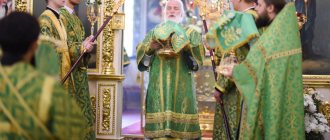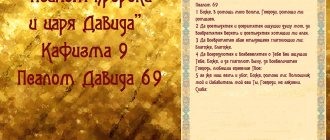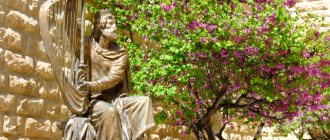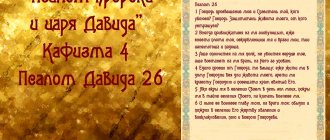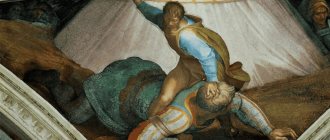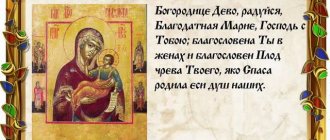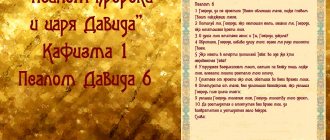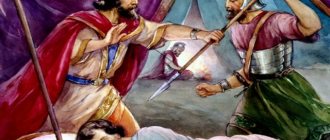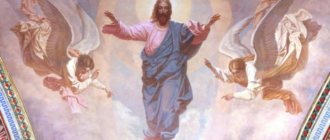Text of prayer Psalm 108
In Church Slavonic
Finally, Psalm to David 1 O God, do not keep silent from my praise, 2 for the mouth of the sinner and the mouth of the flatterer have opened against me, speaking against me with a flattering tongue, 3 and having deceived me with hateful words, and despised me. 4 Instead of loving me, I slandered me, but I prayed, 5 and brought upon me evil for good, and hatred for my love. 6 Place a sinner on him, and let the devil stand at his right hand. 7 Let him always be judged, and let him come out condemned, and let his prayer become sin. 8 Let his days be short, and let another take over his bishopric: 9 Let his sons be orphans, and his wife a widow: 10 Let his sons who move abide and ask, and be driven out of their homes. 11 Let the lender seek all that is his, and let others delight in his labors. 12 Let there be no intercessor for him; let him be the one who takes advantage of his orphans. 13 Let his children be destroyed; let his name be consumed in one generation. 14 Let his father’s iniquity be remembered before the Lord, and let his mother’s sin not be purged. 15 Let them be taken out before the Lord, and let their remembrance be consumed from the earth. 16 I do not remember to show mercy, but the pursuit of man is poor and wretched, and it is with a tender heart to kill. 17 And thou shalt love the curse, and it will come to him, and will not desire the blessing, and will depart from him. 18 And he put on an oath like a robe, and went down like water into his belly, and like oil into his bones. 19 Let him be like a robe, like a robe he will put on, and like a girdle he will be girded with it. 20 This is the work of those who lie against me before the Lord and speak evil against my soul. 21 And thou, O Lord, Lord, do unto me in thy name, for thy mercy is good. 22 Deliver me, for I am poor and wretched, and my heart is troubled within me. 23 Like the shade, when it never evaded, it shook itself off and shook like a prune. 24 My knees are weary of fasting, and my flesh is changed for the sake of oil. 25 And I was reproached by them when they saw me, and shook their heads. 26 Help me, O Lord my God, and save me according to Your mercy, 27 and let them understand that this is Your hand, and You, O Lord, created this. 28 They will be cursed, and You will bless them; those who rise up against me will be ashamed, but Your servant will rejoice. 29 Let those who lie against me clothe themselves with shame, and clothe themselves with their cold as if I were clothed. 30 Let me confess the Lord earnestly with my mouth, and in the midst of many I will praise Him, 31 for He has appeared at the right hand of the poor, to save my soul from those who persecute.
In Russian
For execution. Psalm of David. 1 God, do not remain silent in response to my praise! 2 For the mouth of the sinner and the mouth of the deceitful one were opened against me, they spoke against me with a deceitful tongue, 3 and surrounded me with words of hatred, and fought against me without cause. 4 Instead of loving me, they slandered me, but I prayed; 5 And they repaid me with evil for good and hatred for my love. 6 Set a sinner over him, and let the slanderer stand at his right hand; 7 when he is judged, let him come out condemned, and let his prayer become sin. 8 Let his days be short, and let another take his office; 9 Let his sons be orphans, and his wife a widow; 10 Let his sons wander and wander and beg, and be driven out of their ruins. 11 Let the lender demand all that he has, and let others plunder his labors; 12 Let him have no intercessor, and let him have no mercy on his orphans; 13 Let his children be born to destruction; in one generation let his name be blotted out. 14 Let the iniquity of his fathers be remembered before the Lord, and let not the sin of his mother be blotted out; 15 May they always be before the Lord, and may the memory of them be destroyed from the earth, 16 because he did not think to show mercy and pursued a poor, needy, and broken-hearted man, in order to kill him. 17 And he loved the curse, and it would come to him, and he did not desire the blessing, and it would be removed from him. 18 And he clothed himself with the curse as with a garment, and it went into his bowels like water, and into his bones like oil; 19 Let it be to him like a garment that he puts on, and like a girdle with which he always girds himself. 20 This is the fate of those who slander me from the Lord and speak evil against my soul. 21 And Thou, O Lord, Lord, do unto me for Thy name's sake, for Thy mercy is good. 22 Deliver me, for I am poor and needy, and my heart is troubled within me. 23 Like a shadow when it turns away, I disappeared; they shook me off like a locust; 24 My knees are weak from fasting, and my flesh is changed, for there is no oil. 25 And I became a reproach to them: when they saw me, they shook their heads. 26 Help me, O Lord my God, save me according to Your mercy, 27 and let them know that this is Your hand and You, O Lord, have done this. 28 They will curse, but You will bless; Let those who rise up against me be ashamed, but let Your servant rejoice. 29 Let those who slander me be clothed with shame, and let them clothe themselves with their shame as with a garment. 30 I will earnestly glorify the Lord with my mouth and in the midst of many I will praise Him, 31 for He appeared at the right hand of the poor to save my soul from the persecutors.
Prophetic meaning of Psalm 108
David's psalm is filled with prophecies.
If we look at him from the perspective of centuries, then in the man of God himself we easily find a prototype of Jesus, who was betrayed by Judas, like David Doikom. Rivers of blood flowed during the execution of 300 priests, and in the days of early Christianity, bloody reprisals awaited the followers of Christ.
The words of the prophecy about the whole people came true: “Let his sons be orphans, and his wife a widow,” when in 63, after the uprising of the Jews, the Romans killed men, and drove women and children out of their homes, condemning them to starvation.
David foresaw the disasters that awaited the Jews. “Let his father’s iniquity be remembered before the Lord, and let his mother’s sin not be purged.” The father is the people who sinned in the desert, the mother is the Jews who crucified Jesus Christ.
Seeing the cruel words of the prophetic message, some evil people rub their hands with joy that they will punish the offenders with God's powers, while forgetting about the allegorical meaning of David's prayer and his prophetic power.
Not many people who demand punishment for offenders, seeing the title “Vengeance on Enemies,” try to find out how to read and understand Psalm 108.
Psalms of David, Bible
History of writing
Life for David, the future king of Judah and Israel, was never easy. A thousand years BC, the same internecine wars were going on, brother went against brother, and killing an enemy was considered honorable. David lived honestly and turned to God with requests to punish his enemies. During the reign of King Saul, David's predecessor, the latter had more than once the opportunity to take the throne. If David had killed Saul, he would have become king earlier, but he never even raised his hand against him.
David's Psalm 108 is based on Deuteronomy 28, which describes curses. It is possible that all the words were written for the Jew Doik, who betrayed not only David, but also 300 priests, thereby dooming them to death.
Interpretations of David's work
All theologians unanimously attribute its authorship to King David. Since ancient times, the Holy Fathers saw two meanings in the chant:
- historical, associated with specific events in the life of the prophet. David;
- prophetic, relating to the times of the Messiah, His betrayal, the Crucifixion.
Useful materials
Circumstances of creation
The appearance of the text is correlated with the disasters that David suffered for many years from Saul, the first Jewish ruler.
Persecutor
Having sinned, Saul lost grace, so that the deprivation of his kingdom was only a matter of time, as the great prophet Samuel told him about. Many people also knew another prophecy of this saint of God: that the son of Jesse, David, would become the sovereign of Israel.
Saul watched with fear the fulfillment of what was predicted: the growth of popularity of the betrothed sovereign, despite the fact that he did not at all strive to rule, his constant successes in war. That is why Saul sought to destroy his opponent, even if he saw that he was going against the will of God. More than once David had to hide in the desert, even leave the country. And sometimes Saul’s wrath fell even on innocent people.
Doeg the Edomite
The following incident turned out to be especially terrible. Once again leaving Saul, David came to Nob to the priest Ahimelech. By this time, the warriors with him were tired, even weak from hunger. David came to the Tabernacle minister for simple help - at least in the form of food. The Bible indicates that Ahimelech, who was well aware of Saul's attitude towards David, was “troubled.” But, finally, he took pity on the innocently persecuted - even to the point that, having no other food, he gave them sacrificial bread (1 Sam. 21:1-6).
At the same time, standing nearby was a certain Doeg from the area of Idumea (the southern part of the kingdom of Israel), overseer of Saul’s flocks. Seeing an opportunity to curry favor, he immediately informed the king about what had happened, presenting the matter in such a way that Ahimelech was conspiring with the disgraced David against the sovereign .
Then Saul, blinded by rage, ordered the informer: “Go and kill the priests.” The helpful Edomite did more: “... attacked the priests, and killed that day eighty-five men who wore the linen ephod; and Nob, the city of the priests, he smote with the sword; And men and women, and young men and children, and oxen, and donkeys, and sheep, he smote with the sword” (1 Samuel 22:18-19).
The publisher of the “Explanatory Bible” A.P. Lopukhin and other theologians believe that it was this act that caused David’s pain and anger. He was ready to endure persecution himself, but now he unwittingly became the cause of the death of innocent people.
Iconography: David, prophet, king. Dating: XVI century. Second half of the 16th century. 1560s. Origin: from the iconostasis of the Cathedral of the Nativity of Our Lady of the Anthony Monastery. Material: wood, tempera. Frame material: silver. Dimensions of the icon: height 78.2 cm, width 61.3 cm. Half-length image of the prophet David with a scroll in his hand. NGOMZ 2759. © Novgorod State United Museum-Reserve
Moreover, this happened simply because Saul lost his head with rage, and Doik “as best as possible” tried to fulfill his order, having neither reverence for sacred things, nor simple human pity, and attacked children and women. After all, it was so important for him to maintain the favor of the king, his high position, and, of course, income.
Prophecy of Judas
The choice that Doik made so easily is often made by people committed to the material world and its benefits. Therefore, the content of the psalm was initially much broader than simply curses uttered out of a sorrowful heart against Saul’s servant. Unfortunately, what he did was unusual except for its extreme cruelty. But don’t many people do the same thing, betraying for their own benefits?
A little more than 1000 years after David's bitter words, the sound of the 108th took on a new meaning. The Jews of the time of the coming of the long-awaited Messiah, the Lord Jesus Christ, suddenly saw that the 108th almost in detail describes nothing more than the betrayal of Judas.
Under the “mouth of a sinner and the lips of a flatterer” one can clearly discern the Jewish high priests who rebelled against God, and Judas, who spoke to the Savior about his devotion to his face, but in reality was plotting betrayal.
He is quite similar to Doik, who was present during David’s conversation with the priest, and perhaps even said some sympathetic words to the persecuted man.
The curses uttered turned out to be especially terrible - David did not just speak out of grief, but prophesied about the future:
- the psalmist speaks of the devil, who will take the place of God “at the right hand” (on the right) of the traitor; The Evangelist John directly writes about Satan entering Judas after the Last Supper (John 13:27);
- the traitor’s prayer is imputed to him as a sin, as insincere; So Judas, participating in the celebration of Easter, the last in the earthly life of the Teacher, prayed with the other Apostles, but, in fact, hypocritically;
- the words “may his days be short” were also fulfilled on him with literal accuracy, that is, may his life be shortened; having abandoned God, after Christ was betrayed to death, Judas fell into complete despair and committed suicide;
- the terrible sin of betrayal curses the entire family of the sinner to the point that they are “consumed from the earth,” that is, their memory disappears.
At the same time, the Holy Spirit, through the mouth of the prophet, says that what happened is the consequences of the personal choice of a person who does not know pity for the “poor and wretched” who is grieving. Such a sinner “loved the oath” (curse), which will become for him a “robe”, “like water in his belly, and like oil in his bones.” All this completely removes one from God and makes repentance impossible.
"Let the bishopric accept him"
The prophetic meaning of David's words was so obvious to the first Christians that St. Peter literally quotes the words of the psalm after the Ascension of the Lord, when the disciples are faced with the need to replenish the ranks of the 12 Apostles after the fall and death of Judas:
“Men and brethren! It was necessary to fulfill what the Holy Spirit predicted in Scripture through the mouth of David about Judas, the former leader of those who took Jesus... In the book of Psalms it is written: let his court be desolate, and let there be no one living in it; and let another take his dignity" (Acts 1:16, 20)
Thus, in fulfillment of the words of the prophet, the election of a new Apostle, Matthias, took place.
Hope in the Lord
The prayer ends with firm confidence in God’s mercy towards the persecuted:
“And You, Lord, Lord, do unto Me in Your name. Deliver Me, for I am poor and wretched... They are cursed, and You bless them: let those who rise up against Me be ashamed. Your servant will rejoice.”
These words contrast so much with the beginning, where David pours out his hurt and sorrow, that it is difficult not to think that the psalmist received from the Lord a clear assurance that the persecution against him would cease. And more than 1000 years later, Christians drew from these words confidence in the victory of Christ over the world.
However, there was also a different understanding.
When should you read Psalm 108?
Small misunderstandings or quarrels can happen every day, even a stranger can cause trouble or spoil the mood, but this is not a reason to turn to Psalm 108.
It is important to understand that curses are very powerful and dangerous; using them incorrectly can bring disaster to the one who pronounces them. A person should be brought to God’s judgment by reading Psalm 108 if he sins:
- behaves inappropriately, insults, blasphemes;
- does not want to resolve the conflict peacefully;
- does not listen to the words of the clergy.
How to read
- The scripture is read over a photograph of the ill-wisher, or over a piece of paper with the name of the offender.
- And also based on reviews of those who read the psalm on enemies, the maximum effect of retribution was noted over reading the psalm on a personal item or on the enemy’s food.
- If a person has several worst enemies at once, the Psalm of David is read for each of them separately.
- The psalm is not read on Sundays and on major Orthodox holidays.
- Psalm 26 - interpretation;
- Text of Psalm 34 in Russian;
- Why do they read Psalm 33?
Interpretation of David's Psalm 108
The words of Psalm 108 in Russian contain not only the feelings of the reader, but also curses addressed to his enemy. In many ways, these terrible curses came true for David's enemies, which is why he is considered prophetic.
300 priests were brutally executed, rivers of blood flowed at this time, just as David described. The same thing happened during the persecution of the followers of Jesus Christ. Many try to use the orphanhood of children and the widowhood of wives, the punishments and troubles that David sends to his enemies in Psalm 109 to their advantage. But we must not forget about the prophetic power of these words and condemn people to suffering in vain.
Not everyone knows how to correctly read Psalm 108 “Vengeance on Enemies”; they often pay attention only to its name.
Psalm 108 – who read on enemies and overcoming conflict
Alas, today our society consists of a significant part of people suffering from addiction to alcohol or drugs, and Russia is one of the first places in the world for these diseases.
Alcoholics and drug addicts living nearby cause a lot of suffering to their neighbors. Even if they live in a separate apartment, often the whole house hears noise, smells the corresponding odors, suffers from dirt and unpleasant visitors.
Remember that alcoholism and drug addiction are a disease, such people cannot but irritate, but you also need to pray for them as if they were sick, without the desire for revenge on your enemies. Do not argue and conflict openly with such sick people. First of all, if you are worried about rowdy behavior, noise at inappropriate times, or even syringes lying around, contact the police.
Pray to the Lord Psalm 108 from your enemies and ask the saints that the situation will be resolved without harm to you and for the salvation of the souls of these unfortunate ones. Let us remind you again that the Church considers any conspiracies against drunkenness, any appeal to dark forces through sorcerers, witches and psychics to be a sin. Do not resort to evil influence, it will return to you, and you will only stain your soul with sin.
Reading rules
The first thing to do before reading Psalm 108 is to calm down. To do this, you can read “Our Father.” Only in peace can one assess whether a person deserves the curses that will be in store for him. It is important to understand that only God will decide whether the enemy deserves punishment, and if he is innocent, all horrors will return to the one who sent them.
Psalm 108 can be found in the prayer book, since it is not corruption - by reading it, a person gives judgment to God, and does not administer it himself. And yet you cannot refer to this text on Sundays and Christian holidays.
( 6 ratings, average: 4.83 out of 5)
When and why do they read?
And yet, at first glance, Psalm 108 contains, in the words of St. John Chrysostom, the “word of passion” of the Old Testament man, brought up on the principles of “an eye for an eye”, “a tooth for a tooth”.
This so clearly does not correspond to the commandment of love for those who hate and offend, which is contained in the Gospel, that it causes confusion for some believers - is it even possible to read the 108th?
Here is what Archpriest Andrei Tkachev says about such doubts:
“Among John Chrysostom’s requests for deliverance, there is a good prayer: “Lord, deliver me from certain people, and demons, and passions, and from all other inappropriate things.” It is curious that “certain people” are put in the very first place... then only from demons, from passions and other inappropriate things. This is amazingly insightful and accurate. Demons do not directly harm us thanks to the angelic protection and restraining right hand of God... But they abandon thoughts, spoil people’s morals and then act as they want through evil people.”
Taking into account the meaning of 108, it can and should be read:
- during persecution from superiors or even from enemies;
- during attacks of passions of any kind, general loss of spiritual peace, despondency, despair.
Even though the words spoken by the psalmist are bitter and sometimes cruel, a careful reading of 108 tells us that we need to be angry not at people, but at the spirits of evil.
By confronting them, we will understand our weaknesses. Awareness of them will help us to truly love our enemies, like the author of the song, King David.
Does anyone read a prayer for a wish?
Hello!! Is anyone else reading a prayer to Saint Martha for the fulfillment of a wish?? Is there any progress??
Prayer is very powerful.
Fulfills all desires Prayer to St. Martha The prayer is very powerful; Fulfills all desires (if it pleases Heaven - this means that you will not harm anyone with your desires, voluntarily or unwittingly); wishes are often fulfilled even before the end of the reading cycle.
1. Prayer to Saint Martha - Read 1 time
“Oh Saint Martha, You are Miraculous! I turn to you for help! And completely in my needs, and you will be my helper in my trials! I promise you with gratitude that I will spread this prayer everywhere! I humbly and tearfully ask you to console me in my worries and hardships! Humbly, for the sake of the great joy that filled your heart, I tearfully ask you to take care of me and my family, so that we preserve our God in our hearts and thereby deserve the Saved Supreme Mediation, first of all, with the concern that now burdens me... (further desire, e.g., help me find a well-paid job; help me meet my loved one and create a happy family; etc.) ... ... I tearfully ask you, Helper in every need, overcome hardships the way you defeated the snake, until I lay at Your feet!”
2. Prayer “Our Father” - read 1 time (everyone knows)
3. Prayer to the Most Holy Theotokos - Read 1 time “O Mother of God, Virgin, rejoice! Blessed Mary, the Lord is with you! Blessed are You among Women and Blessed is the Fruit of Your Womb, for You have given birth to the Savior of our souls!”
4. “Glory to the Father and the Son and the Holy Spirit! And now, and forever, and forever and ever! Amen!" — Read 1 time 5. “Saint Martha, ask Jesus for us!” — Read 9 times *- Prayer is very powerful; Fulfills all desires (if it pleases Heaven, this means that you will not harm anyone with your desires, voluntarily or unwittingly); wishes are often fulfilled even before the end of the reading cycle. - You need to read it in a cycle - 9 Tuesdays in a row. If one of the Tuesdays is missed, start all over again. If your wish came true earlier, still read to the end of the cycle (all 9 Tuesdays). There should be a candle burning nearby (to the right) on the table. You can use any candle, but preferably a church candle, a small one. - The time of day - morning or evening - does not matter. If the candle is a church candle, let it burn out to the end; if it’s different, let it burn for 15-20 minutes, and then you can put it out (don’t blow it out!). It is better if you lubricate the candle with bergamot oil (with your palm, from bottom to top, from the base of the candle to the wick). It’s also better if there are fresh flowers nearby! But bergamot and flowers are not necessary, but very desirable! — It is also highly recommended to take a bath and wear light clothes before reading prayers (any); be in the room alone! — The desire is better to write down on paper so that it always sounds the same when reading the entire text of the prayer. One cycle - one desire. — The prayer cannot be printed and read; You need to rewrite all the texts by hand and use them already! The text you have rewritten cannot be passed on to others - each person must rewrite the text of the prayers in his own hand (you can dictate to him or simply give him yours or this printed text for rewriting).
Circumstances of writing Psalm 108
King David lived in a time when Christ’s commandments about loving one’s neighbors and forgiving one’s enemies were not yet known to the world. Wars and murders were common, and revenge on the enemy was considered valor. The pronouncing of curses was part of pagan rituals and still remained in the habits of the Jews, as a relic.
After the coming of Christ into the world, Old Testament customs were abolished and the curse of one person on another, previously acceptable, became a great sin in the eyes of God.
It is not known exactly who the prophet David had in mind when he called curses on his head. David had many envious people, since he was chosen by God from low dignity and many wanted to receive his glory.
Orthodox scholars of the Psalter suggest that the hero of the psalm could be Saul, the first king of Israel. He noticed the simple shepherd David after he defeated the unsurpassed strongman Goliath. Having made the brave young man his armor bearer and son-in-law, Saul many times witnessed the blessings that came from God to the meek and honest warrior. Finally, the king was filled with envy and twice tried to kill David, who did not cease to serve him faithfully. After unsuccessful assassination attempts, Saul sent him several times into the most dangerous battles, but thanks to God's help, his faithful servant remained alive. David wrote many psalms, mourning the loss of the king's friendship and praying for divine protection from his vengeance.
Those who wish to read Psalm 108 for retribution against enemies should know that its author himself twice had an easy opportunity to kill Saul, catching him either sleeping or relieving himself. But he refused to raise his hand against the king appointed by God .
The psalm could also refer to Saul’s chief sheep shepherd, Doik, who betrayed David and was forced to seek protection from persecution from the priests of the Jerusalem Temple. In the eyes of Old Testament Jews, Doeg became a symbol of cruelty, since he not only betrayed David, but also slandered him as if he was plotting to kill Saul. The angry king ordered the arrest and execution of more than 300 priests and Levites who were hiding the fugitive. But none of the executioners dared to raise a hand against the servants of the Lord. Then Doik himself, taking a sword, slaughtered hundreds of the condemned. Rivers of blood filled the square. Can this crime be compared with the morning rudeness of a minibus driver?
